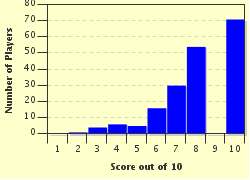Quiz Answer Key and Fun Facts
1. Negative magical words, a curse
2. The stem of a palm tree frond
3. A criminal
4. That which can be shaped without breaking
5. Being malicious or spiteful, wishing harm
6. Tent caterpillars
7. A waterfront esplanade or embankment
8. A kind of hammer
9. The failure of the digestive system to absorb nutrients
10. A deep-fried ball of sweetened yeast dough
Source: Author
FatherSteve
This quiz was reviewed by FunTrivia editor
ponycargirl before going online.
Any errors found in FunTrivia content are routinely corrected through our feedback system.

